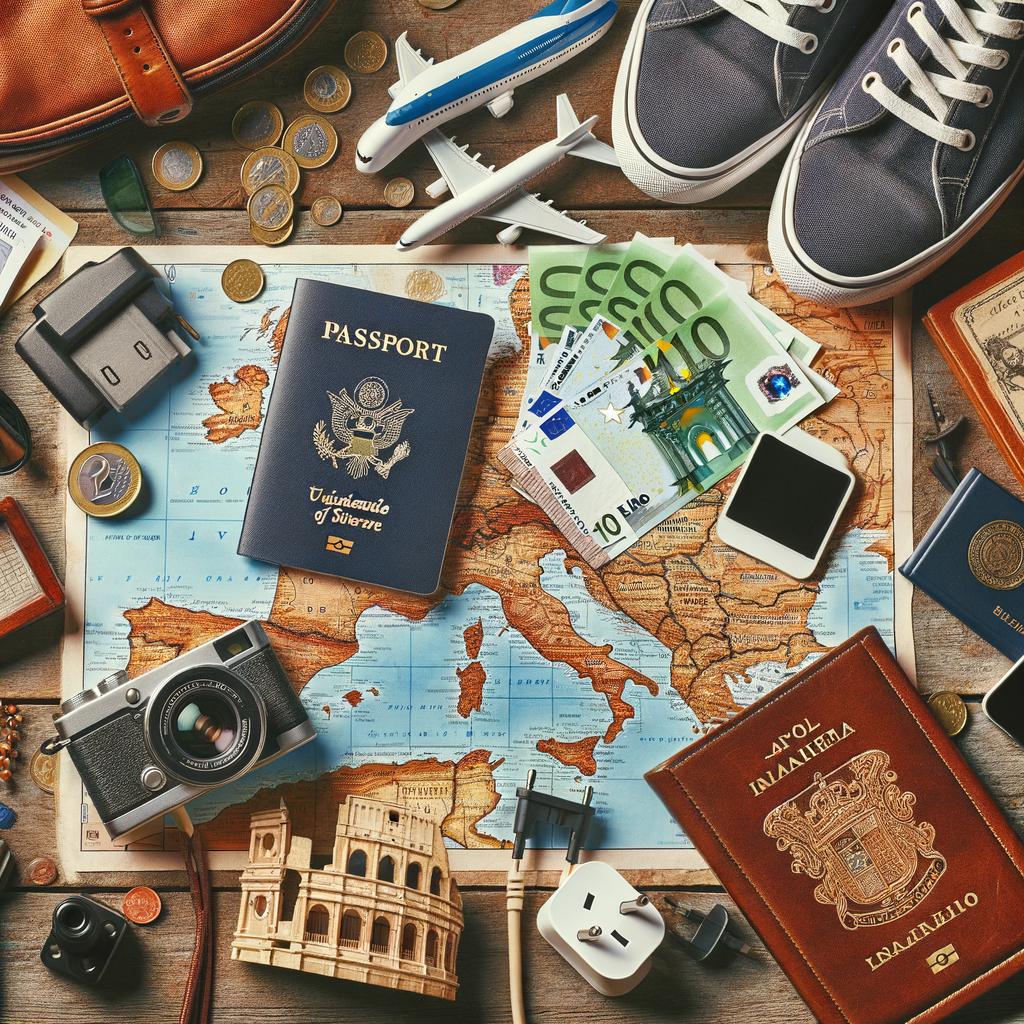Are you planning a trip to Italy and wondering what is required to travel to Italy? Look no further. In this comprehensive guide, we will cover everything you need to know before embarking on your Italian adventure. From visa requirements and passport validity to health precautions and cultural etiquette, we’ve got you covered.
Italy is a beautiful country with a rich history, stunning landscapes, and world-renowned cuisine. Whether you’re planning to explore the ancient ruins of Rome, relax on the Amalfi Coast, or indulge in the art and culture of Florence, it’s essential to ensure that you have all the necessary requirements in place for a smooth and enjoyable trip.
In this guide, we will delve into the specifics of visa requirements for traveling to Italy, ensuring your passport is up to date for entry into the country, the importance of travel insurance and what it should cover, as well as important health precautions and safety tips for your journey.
Additionally, we will provide insights into currency considerations, transportation options within Italy, finding the best accommodation for your stay, respecting Italian customs and cultural norms, as well as keeping track of all the important documents needed for your trip.
So let’s dive in and get ready for an unforgettable Italian adventure.
Visa Requirements
Italy is a dream destination for many travelers, known for its rich history, stunning art and architecture, delicious cuisine, and beautiful landscapes. But before you can embark on your Italian adventure, it’s important to understand the visa requirements for traveling to Italy.
For citizens of the United States and many other countries, Italy is part of the Schengen Area, which allows for visa-free travel for up to 90 days within a 180-day period. This means that if you are planning a short-term visit to Italy for tourism, business, or family visits, you generally do not need a visa.
However, if you intend to stay longer than 90 days or engage in activities such as work or study, you will need to obtain the appropriate visa before your trip.
It’s crucial to check the specific visa requirements for your nationality well in advance of your travel dates. The requirements may vary depending on your country of origin and the purpose of your visit. In addition to determining whether you need a visa at all, it’s also important to understand the application process and any supporting documents that may be required.
| Visa Type | Duration |
|---|---|
| Short-Stay Schengen Visa | Up to 90 days within a 180-day period |
| Long-Stay Visa | More than 90 days |
Passport
When traveling to Italy, one of the most crucial things to check off your list is ensuring that your passport is valid for entry into the country. Without a valid passport, you will not be allowed to enter Italy or any other country for that matter. It is important to understand the passport requirements and make sure you have all the necessary documentation before embarking on your trip.
Passport Validity
The first thing to consider when traveling to Italy is the validity of your passport. The Italian government requires that your passport be valid for at least three months beyond your planned date of departure from the Schengen area. If you hold a passport from a non-Schengen area country, it should be valid for at least six months beyond your intended date of departure from Italy.
Renewing Your Passport
If your passport does not meet the validity requirements, it is essential to renew it before traveling to Italy. Renewing your passport can take some time, so it’s best to start this process well in advance of your planned trip. Many countries offer expedited passport renewal services for an additional fee if you find yourself short on time.
Copies and Digital Backups
In addition to having a valid physical passport, it’s also recommended to make digital copies and physical photocopies of the main page of your passport as well as any visas or residency permits you may hold. This extra step will save you a lot of trouble if your original documents are lost or stolen during your travels in Italy.
Having these copies can help facilitate the process of obtaining a replacement document through your embassy or consulate and proving your identity while abroad.
Travel Insurance
When planning a trip to Italy, it’s essential to consider the importance of travel insurance. Travel insurance provides financial protection in case of unforeseen events such as trip cancellations, medical emergencies, or lost luggage. It is recommended to purchase travel insurance that covers trip cancellation/interruption, medical expenses, emergency evacuation, and baggage loss/delay. In the event of an emergency, having adequate travel insurance can provide peace of mind and minimize potential financial losses.
In addition to the basic coverage mentioned above, travelers should also consider supplementary coverage options based on their specific needs and activities planned while in Italy. For example, if you plan to engage in adventure sports or activities such as skiing or hiking, it would be advisable to supplement your coverage with a policy that includes hazardous activity coverage.
Similarly, if you have pre-existing medical conditions, it’s important to ensure that your travel insurance policy provides adequate coverage for any related medical treatment abroad.
It’s worth noting that some credit cards and personal insurance policies may offer limited coverage for certain aspects of travel (such as rental car collision damage or trip cancellation). However, it’s crucial to carefully review the terms and limitations of these coverages before relying solely on them for your trip to Italy.
| Travel Insurance Coverage | Important Considerations |
|---|---|
| Trip Cancellation/Interruption | Review policy for covered reasons for cancellation or interruption |
| Medical Expenses/Evacuation | Consider supplemental coverage for hazardous activities or pre-existing conditions |
| Baggage Loss/Delay | Ensure coverage is sufficient for value of belongings |
Health and Safety
When planning a trip to Italy, it’s important to prioritize your health and safety. This includes being aware of any necessary vaccinations, health precautions, and general safety tips to ensure a smooth and enjoyable travel experience. Here’s what you need to know about staying healthy and safe while visiting Italy.
Vaccinations and Health Precautions
Before traveling to Italy, it’s essential to check if there are any recommended or required vaccinations for entry into the country. While there are no specific vaccination requirements for travelers from the United States, it’s still a good idea to be up-to-date on routine vaccines such as measles, mumps, rubella, diphtheria, tetanus, pertussis, chickenpox, and influenza.
Additionally, it’s advisable to consult with a healthcare professional or travel medicine specialist to discuss any other health precautions based on your individual medical history and the specific areas of Italy you plan to visit.
Safety Tips
Italy is generally considered a safe country for travelers, but like any destination, it’s important to stay vigilant and aware of your surroundings. Be mindful of pickpockets in crowded tourist areas and keep an eye on your belongings at all times.
It’s also wise to be cautious when using public transportation and avoid walking alone in poorly lit or deserted areas, especially at night. Familiarize yourself with emergency contact information for local authorities as well as the nearest embassy or consulate representing your home country.
Emergency Services
In case of a medical emergency while in Italy, dial 112 for immediate assistance. This number will connect you to the police, ambulance services, fire department or coast guard depending on the nature of the emergency. It is also recommended that visitors carry adequate travel insurance that includes coverage for medical expenses and emergency medical evacuation back home if needed.
Currency and Finance
When traveling to Italy, it’s important to have a good understanding of the currency and financial considerations to ensure a smooth and enjoyable trip. The official currency of Italy is the Euro (€), and it is widely accepted throughout the country. Before traveling, it’s recommended to check the current exchange rate for your home currency to the Euro, so you have an idea of how much money you’ll need for your trip.
It’s also essential to consider how you will access funds while in Italy. ATM access is widely available in cities and towns throughout the country, and using ATMs is often a convenient way to withdraw Euros at a favorable exchange rate.
However, be mindful of any foreign transaction fees or ATM fees that your bank may charge for using ATMs abroad. Additionally, it’s a good idea to notify your bank of your travel plans to prevent any issues with accessing funds while in Italy.
When considering financial matters during your trip, it’s crucial to have a budget in mind and keep track of your expenses. Italy can be a relatively expensive destination, especially in popular tourist areas like Rome, Florence, and Venice.
It’s advisable to carry a mix of cash and cards for payment options, as some smaller establishments may only accept cash. By being mindful of these financial considerations, you can enjoy all that Italy has to offer without any unnecessary stress about money matters.
Transportation
When traveling to Italy, it’s important to consider how you will navigate the country’s transportation system. Whether you plan to explore the bustling cities or relax in the charming countryside, understanding your options for getting around is crucial. Here are some key points to keep in mind when it comes to traveling within Italy:
- Trains: Italy boasts an extensive and efficient rail network, making train travel a popular choice for both domestic and international tourists. The primary operator, Trenitalia, offers high-speed connections between major cities as well as slower regional services that connect smaller towns and villages.
- Buses: In addition to trains, buses are another convenient mode of transportation in Italy. Local bus services are available in urban areas, while long-distance buses can be a cost-effective way to reach destinations not serviced by trains.
- Rental Cars: If you prefer more flexibility and independence during your travels, renting a car may be the best option for you. However, keep in mind that driving in Italy can be challenging due to narrow roads, limited parking, and strict traffic regulations.
Regardless of which mode of transportation you choose, it’s essential to familiarize yourself with the relevant schedules, routes, and ticketing options. Additionally, consider the time and cost implications before making any decisions about how you will get around during your stay.
Lastly note that what is required to travel to Italy includes having an International Driving Permit if planning on driving a rental car as a foreign visitor. This permit is necessary alongside your regular driver’s license and serves as a valid form of identification while navigating Italy’s roadways.
Accommodation
When traveling to Italy, finding the right accommodation is essential for a comfortable and enjoyable trip. Italy offers a wide range of options for travelers, from luxury hotels to budget-friendly hostels and charming vacation rentals. Whether you’re looking to immerse yourself in the historic city center or relax in a picturesque countryside villa, there are accommodations to suit every preference and budget.
For those seeking a luxurious experience, Italy’s major cities such as Rome, Florence, and Venice offer a myriad of upscale hotels with stunning views, world-class amenities, and exceptional service. Travelers can indulge in the opulence of historic palaces turned into five-star hotels or opt for modern boutique accommodations located in the heart of the city’s cultural landmarks.
If you’re traveling on a budget or prefer a more communal atmosphere, hostels are an excellent option for affordable accommodation in Italy. Many hostels provide dormitory-style rooms as well as private rooms, all with shared facilities such as kitchens and common areas. This is also a great way to meet fellow travelers and exchange tips and experiences about exploring Italy.
For those who desire a more authentic experience and flexibility during their stay, vacation rentals are an ideal choice. From charming apartments in bustling neighborhoods to rustic villas nestled in the countryside, vacation rentals allow visitors to live like locals while enjoying the comforts of home. They provide greater privacy and independence while often being more cost-effective for families or larger groups traveling together.
Italy offers a diverse range of accommodations that cater to different travel styles and preferences. Whether you prefer luxury hotels, budget-friendly hostels, or homey vacation rentals, there are plenty of options available throughout the country that will suit your needs. When planning your trip to Italy, consider what type of accommodation will best enhance your travel experience.
Cultural Etiquette
Italy is known for its rich cultural heritage and traditions, and it’s important for travelers to respect these customs during their visit. Here are some tips for cultural etiquette to keep in mind while in Italy:
- Dress Code: When visiting religious sites such as churches or mosques, it’s important to dress modestly. This means covering your shoulders and knees, so it’s a good idea to pack a shawl or scarf to use as a cover-up if needed.
- Dining Etiquette: In Italy, meals are an important social event and dining etiquette is taken seriously. When dining out, it’s customary to wait for the host or hostess to start eating before you begin your meal. Additionally, it’s considered polite to keep your hands above the table at all times.
- Greetings: Italians are known for their warm and friendly greetings. When meeting someone for the first time, a handshake is customary. Close friends and family members may greet each other with a kiss on the cheek.
In addition to these specific tips, it’s essential to remember that every country has its own unique customs and cultural norms. By taking the time to understand and respect these differences, travelers can have a more enjoyable and culturally enriching experience in Italy.
Remember that by being mindful of Italian customs and traditions, you can ensure a smooth and respectful experience during your visit. Taking the time to learn about cultural etiquette is an essential part of preparing for any trip abroad.
Important Documents
In conclusion, traveling to Italy can be an unforgettable experience, but it’s essential to be prepared. Understanding the visa process, ensuring your passport is valid, and obtaining proper travel insurance are all crucial steps in planning your trip. Additionally, taking the necessary health precautions, familiarizing yourself with the currency and transportation system, and finding suitable accommodation are all important aspects of preparing for your journey.
When traveling to Italy, it’s vital to respect the country’s cultural norms and customs. Being mindful of cultural etiquette will not only enhance your experience but also show respect for the local traditions. Furthermore, keeping track of important documents such as your ID, itinerary, and emergency contacts is essential for a smooth and stress-free trip.
In summary, what is required to travel to Italy goes beyond just obtaining a visa and having a valid passport. It involves thorough preparation in various aspects such as health, safety, currency, transportation, accommodation, cultural etiquette, and documentation management. By being well-prepared and informed about these essentials, you can ensure a successful and enjoyable trip to Italy.
Frequently Asked Questions
What Documents Do I Need to Travel to Italy?
To travel to Italy, you will need a valid passport with an expiration date at least three months beyond your planned departure from Italy. For stays longer than 90 days, a visa may be required depending on your nationality.
What Is Required for a US Citizen to Visit Italy?
For a US citizen to visit Italy, a valid US passport is required. No visa is necessary for stays in Italy of up to 90 days for tourism or business purposes. However, the passport must be valid for at least three months beyond the period of intended stay.
Are There Any Travel Restrictions to Italy?
As of now, due to the COVID-19 pandemic, there are travel restrictions in place for traveling to Italy. This includes mandatory quarantine and COVID testing requirements for travelers arriving from certain countries. It’s important to regularly check the latest travel advisories and restrictions before planning any trip to Italy.

I’m a passionate traveler, writer, and Italophile. My fascination with Italy’s history, art, and culture has led me on countless adventures across the Italian landscape. Through “I Live Italy,” I share my love for this extraordinary country and aims to inspire others to explore its boundless beauty.





